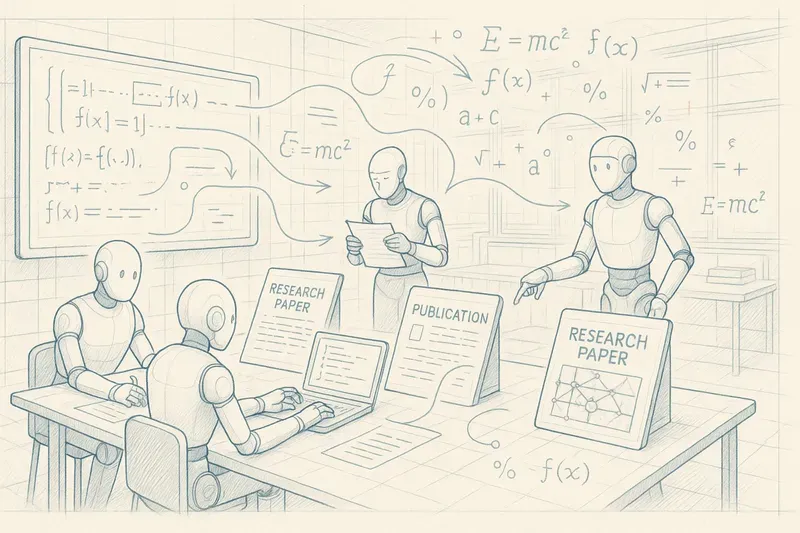
Here are the top 5 most relevant AI papers from arXiv week 31/2025, complete with analysis and insights.
Publications at a Glance
MeLA: A Metacognitive LLM-Driven Architecture for Automatic Heuristic Design Zishang Qiu, Xinan Chen, Long Chen, Ruibin Bai | 7/28/2025
Evo-DKD: Dual-Knowledge Decoding for Autonomous Ontology Evolution in Large Language Models Vishal Raman, Vijai Aravindh R | 7/29/2025
DICE: Dynamic In-Context Example Selection in LLM Agents via Efficient Knowledge Transfer Ruoyu Wang, Junda Wu, Yu Xia, Tong Yu, Ryan A. Rossi, Julian McAuley, Lina Yao | 7/31/2025
Post-Training Large Language Models via Reinforcement Learning from Self-Feedback Carel van Niekerk, Renato Vukovic, Benjamin Matthias Ruppik, Hsien-chin Lin, Milica Gašić | 7/29/2025
MIRAGE-Bench: LLM Agent is Hallucinating and Where to Find Them
Key Insights
This research introduces MIRAGE-Bench, the first comprehensive benchmark designed to systematically evaluate and understand hallucinations in large language model agents. By establishing a detailed taxonomy of agentic hallucinations and employing a fine-grained assessment approach, the study significantly enhances the evaluation framework for interactive LLM scenarios.
Potential Impact
MIRAGE-Bench has the potential to transform the development and deployment of LLM agents by providing a structured method to identify and mitigate hallucinations, thereby improving their reliability in real-world applications. This advancement could lead to more trustworthy AI systems, influencing fields such as robotics, conversational agents, and automated decision-making processes.
MeLA: A Metacognitive LLM-Driven Architecture for Automatic Heuristic Design
Key Insights
The introduction of MeLA represents a significant shift in Automatic Heuristic Design by utilizing a metacognitive framework to evolve instructional prompts for Large Language Models, rather than directly manipulating heuristic code. This innovative approach not only enhances the effectiveness of heuristic generation but also provides a structured method for iterative optimization based on performance feedback.
Potential Impact
MeLA has the potential to revolutionize the field of heuristic design by offering a more interpretable and adaptive means of generating problem-solving strategies, which could lead to advancements in various applications ranging from optimization problems to AI-driven decision-making systems. By integrating cognitive science principles into AI architecture, this research may inspire new methodologies that improve the robustness and adaptability of AI systems across multiple domains.
Evo-DKD: Dual-Knowledge Decoding for Autonomous Ontology Evolution in Large Language Models
Key Insights
The research introduces Evo-DKD, a novel dual-decoder framework that enables autonomous ontology evolution by integrating structured ontology traversal with unstructured text reasoning in large language models. This approach significantly enhances the precision of ontology updates and improves performance on downstream tasks compared to traditional methods that rely solely on either structured or unstructured decoding.
Potential Impact
Evo-DKD has the potential to revolutionize the maintenance of ontologies and knowledge graphs by automating the curation process, thereby reducing manual labor and increasing accuracy in various applications such as healthcare and semantic search. Its dual-decoder design could set a new standard in the field, merging symbolic and neural reasoning to facilitate more dynamic and responsive knowledge base management.
DICE: Dynamic In-Context Example Selection in LLM Agents via Efficient Knowledge Transfer
Key Insights
The research introduces DICE, a novel framework for dynamic in-context example selection in large language model agents, which is grounded in theory and addresses the critical issue of demonstration sensitivity in in-context learning. By decomposing knowledge into transferable and non-transferable components, DICE provides a principled approach to enhance agent performance through context-aware demonstration selection.
Potential Impact
DICE has the potential to significantly improve the robustness and efficiency of LLM agents in various applications by ensuring that only the most relevant examples are used during reasoning steps. This innovation could lead to broader adoption of LLMs in complex tasks, making them more reliable and effective tools across diverse fields such as AI-driven customer service, automated content generation, and decision support systems.
Post-Training Large Language Models via Reinforcement Learning from Self-Feedback
Key Insights
This research introduces Reinforcement Learning from Self-Feedback (RLSF), a novel post-training approach that utilizes a model's own confidence as an intrinsic reward, enhancing the calibration of Large Language Models (LLMs) and their reasoning capabilities. The method allows for fine-tuning without the need for human labels or curated rewards, marking a significant advancement in the efficiency of LLM training processes.
Potential Impact
By improving the reliability of LLMs in reasoning-intensive tasks, RLSF has the potential to enhance applications across various domains such as education and decision-making, where accurate reasoning is crucial. This approach could pave the way for more autonomous and self-sufficient models, reducing dependence on external feedback mechanisms and facilitating broader adoption of LLMs in real-world applications.
 AiBrain
AiBrain